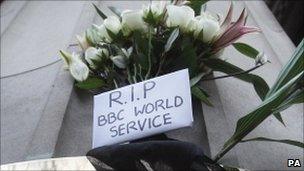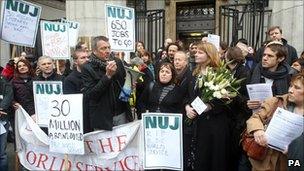Critics warn of major impact of World Service cuts
- Published

Protesters left flowers outside World Service HQ to "mourn" its loss
The BBC has revealed the full extent of the World Service cuts - and they are, if anything, worse than people had feared.
Sir John Tusa, the former head of the World Service, said they were "bad bad bad."
As well closing five of its 32 language services, the World Service will end radio programming in seven languages, including Russian, Mandarin Chinese and Ukrainian, and stop short-wave transmission of six more, including Hindi and Swahili.
There'll be fewer English-language programmes and they'll be less widely heard.
Three Russian-language programmes will continue on the internet, but the Russian service will lose around half its staff. Altogether, 650 jobs will go over three years, a quarter of the current total.
The director of BBC Global News, Peter Horrocks, said the cuts had been forced on the BBC by the reduction in its grant from the Foreign Office, but it had tried to ensure that the most important services were being preserved.
"Our lifeline services in countries like Somalia and Burma - where there is no other source of independent information - are being maintained, but there will be parts of the world which will no longer be served by the World Service," he said.
"We regret the changes that we're having to make because of the funding changes."
Like the BBC website, which also announced major job and service cuts this week, the BBC World Service is using the restructuring to focus more on new media, reflecting the global switch to the internet and mobile devices.
But many World Service staff believe it is running ahead of the audience in many parts of the world, where computers and mobiles have low penetration and short-wave radio is still widely used.
'Cultural diplomacy'
So how far is the coalition government to blame for the cuts?
Sir John Tusa says the Foreign Office should have reduced its International Development budget instead. He believes a £46m cut would have had less impact there than it will at the World Service.
"It is awful for BBC World Service listeners, because they won't have access to the programmes, and awful for British foreign policy because they're now weakening substantially one of the most important elements of international cultural diplomacy," he said.

The NUJ says the cuts will reduce the global influence of the BBC - and Britain
At Westminster, Labour MP Denis McShane clashed with Foreign Secretary William Hague, saying the government was "axing the voice of the BBC" in many countries.
He told Mr Hague: "You are doing in part what no dictator has ever achieved - silencing the voice of the BBC, the voice of Britain, the voice of democracy, the voice of balanced journalism at a time when it is more than ever needed."
Mr Hague retorted that people wouldn't have known from those remarks that the Polish, Bulgarian and Croatian services had been closed by the previous government, of which Mr McShane had been a member.
He said the BBC World Service could not be immune from spending cuts and it was right for it to move more of its services online as audience habits changed with new technology.
"The World Service cannot stand still and services that have become less well-used because of the rise of local broadcasters and falling short-wave audiences sometimes have to close."
Mr Hague said the BBC and the previous government must also share some of the responsibility.
"While any closures may be regretted, it would not be necessary at all were it not for the inherited BBC pension deficit and the vast public deficit inherited from the previous government."
The BBC says the cuts will mean that the World Service audience will fall by more than 30 million people a week - from 180 million to 150 million.
The National Union of Journalists says this will take the World Service's global audience below that of Voice of America and other broadcasters funded by the US government, and that in turn is bound to reduce the influence of the BBC - and Britain.
- Published26 January 2011
- Published24 January 2011
- Published14 January 2011